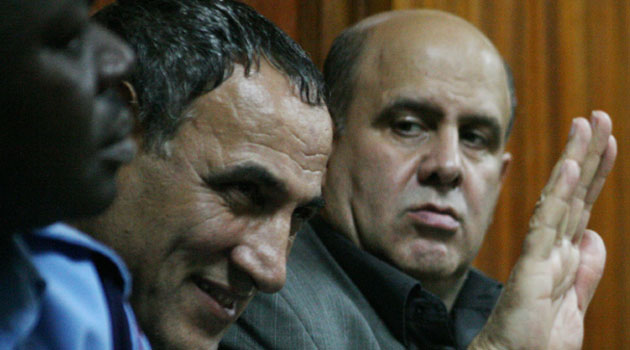
The judges also that circumstantial evidence had placed the two suspects – Ahmad Mohammed and Sayeed Mousavi – at the scene where the deadly chemical was recovered/FILE
NAIROBI, Kenya, Mar 15 – The Supreme Court on Friday overturned a Court of Appeal decision acquitting two Iranian terror suspects sentenced to fifteen years after they were found guilty of three terrorism-related charges.
The ruling of majority judges– Chief Justice David Maraga, Justices Jackton Ojwang and Njoki Ndung’u –carried the day while two– Mohammed Ibrahim and Smokin Wanjala–dissented.
The majority ruling read by Justice Ojwang, the Supreme Court judges found police to have lawfully used intelligence reports to unearth 15 kilograms of Cyclotrimethyle trinitramine, a lethal chemical used to assemble explosives, hidden by the suspects at a golf course in Mombasa in June 2012.
“The use of intelligence or informer reports is standard and common practice. The police are not obliged to declare their informants as that will hamper crime detection,” the bench noted.
“All aspects of evidence on record go in to corroborate the prosecution’s case that the first respondents led the police to the scene where the explosive was dug out,” Justice Ojwang outlined.
The three judges also held that circumstantial evidence had placed the two suspects – Ahmad Mohammed and Sayeed Mousavi – at the scene where the deadly chemical was recovered.
According to Justices Maraga, Ojwang, and Ndung’u the Magistrate Court’s and subsequently High Court decision to reduce the sentence to 15 years for unlawful possession of cyclotrimethylene trinitramine and intent to cause grievous harm was accordingly entered.
“The circumstantial evidence on record points to the respondents as the people who planted the explosive at the scene where it was dug out. There’s no evidence of anyone else having previously planted anything in Mombasa Gold Course and particularly in the vicinity of hole number nine,” the judges noted.
They cited a witness account indicating that the suspects had visited the spot thrice including a day before their arrest in June 2012.
In a dissenting opinion however, Justices Mohammed Ibrahim and Smokin Wanjala dismissed the prosecution case against the two Iranians, saying there was no further evidence to validate claims that the suspects planted the explosive chemical at the golf course. Justice Ibrahim noted that the golf course was unfenced hence any person could have accessed it and planted the chemical/CFM NEWS Justice Ibrahim noted that the golf course was unfenced hence any person could have accessed it and planted the chemical. “In this appeal it was never the prosecution’s case that the appellants had confessed to committing the offences they were charged with. Accordingly, we are satisfied that the two courts below erred in admitting the evidence that allegedly led to the discovery of cyclotrimethylene trinitramine,” he noted.
“Consequently, having examined the decisions of the superior courts, I entertain no doubt that this matter was decided purely on circumstantial evidence and not on admission of a confession,” Justice Ibrahim concluded.
The judges also differed on standard of proof as provided for under Sections 111 and 119 of the Evidence Act, the dissenting judges insisting that evidence adduced had not met the required threshold as set out in statutes.
The case shot into the limelight late last month after a botched plan to facilitate the escape of Mohammad and Mousavi was linked to the Iranian Ambassador to Kenya Hadi Farajvand.
The envoy denied the allegations saying some individuals identifying themselves as interior ministry officials had attempted to extort him.
“I was the one who reported to the Interior Ministry that there were two people who approached me to prepare the departure of the two Iranian nationals saying they would be released,” Ambassador Farajvand said.
According to Farajvand, the two people asked for an unspecified amount of money, a request he declined.
“These people who said they were acting on behalf of the Interior Ministry asked me for money. They however did not say how much money they wanted and immediately I realized they wanted a bribe which I did not offer,” Farajvand said on February 25.
The two suspects had secured their freedom at the Court of Appeal after lodging a second appeal, the High Court having upheld a guilty verdict rendered by a Magistrate’s Court. Justices Daniel Musinga, Roselyn Nambuye, and Steven Gatembu set Mohammed and Mousavi free in February 2018 citing insufficient evidence adduced by the prosecution.
Three people held over the plot to free the Iranians from jail were set free on Friday after the prosecution said there was no evidence to press charges.

About The Author








































